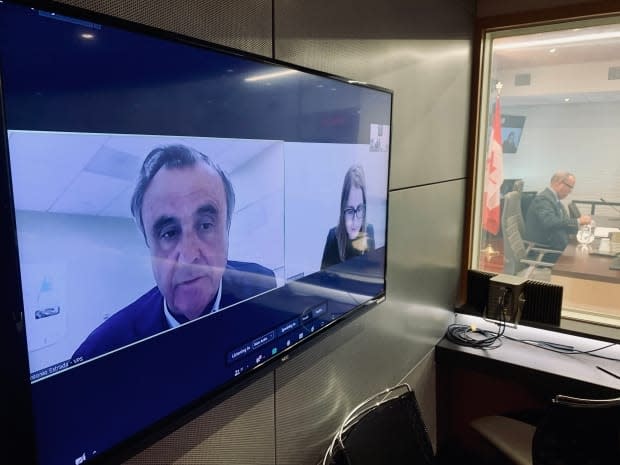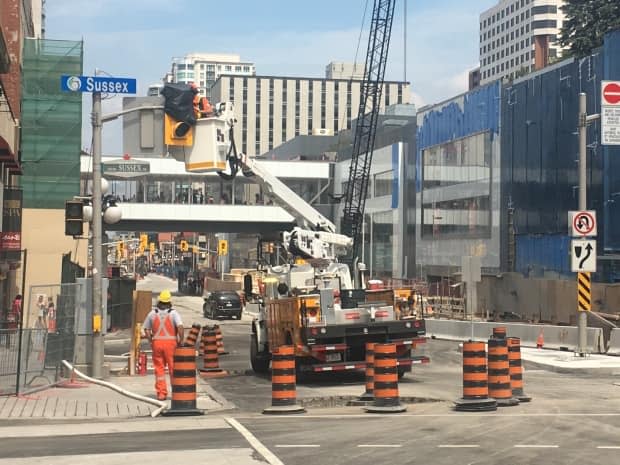City knew LRT likely delayed weeks after the Rideau Street sinkhole

The consortium building the Confederation Line told the city within weeks of the June 2016 Rideau Street sinkhole it would likely not meet its deadline for handing over the LRT, the public inquiry into Ottawa's light rail heard Friday.
But instead, the city pushed for a highly aggressive — and probably unrealistic — catch-up plan, said Antonio Estrada, who was CEO of Rideau Transit Group (RTG) from 2013 to 2018.
On June 8, 2016, a sinkhole in front of the Rideau Centre swallowed three lanes of roadway, taking a parked van and a giant piece of construction equipment with it, although no one was hurt.
Less than two weeks later, Estrada sent a letter to the city's then-rail director Steve Cripps, to say that the sinkhole "may impact" the date that RTG was supposed to hand over the LRT system to the city.
And on Sept. 16, 2016, Estrada wrote Cripps again, this time saying RTG's construction arm, called OLRT Constructors (OLRT-C), was predicting the project would be five months late.
Inquiry commission co-lead counsel Christine Mainville asked Estrada why the city and RTG didn't push back the completion date when it became clear that May 24, 2018 might be impossible to meet.

"I think in the first conversations with the city, the city didn't want to hear about delays. The city wanted us to recover. At the end, RTG agreed to try to recover and produce a recovery plan that was, in my opinion, very aggressive."
Estrada said the city also was likely aware the new schedule would be hard to achieve.
"The recovery plan produced by OLRT-C was very aggressive, probably not impossible, but in a situation like this, to be able to recover, everything needs to go nearly perfect," he told the inquiry. "And that usually doesn't happen."
Cripps told CBC in November 2016 that he wasn't worried about the deadline because the company had told the city that it was "building a schedule to mitigate the impacts so they [could] finish on time."
As late as spring 2017, city officials — in particular, former OC Transpo boss John Manconi — refused to say what hand-over date was stated in the contract, let alone whether it could be met.
But all along, the city knew the LRT builders were struggling to keep up.
Estrada told the commission conducting the inquiry on Friday that RTG knew they wouldn't make the May 24, 2018 handover day by the following summer.
Dispute over completion date
RTG had only 50 metres of excavation left on the 2.5-kilometre downtown tunnel when the sinkhole occurred. Estrada said the sinkhole was particularly discouraging because the constructors had already successfully completed the so-called Rideau "cavern" — the giant hole dug for the future Rideau station — which was considered the most complex part of the project.

In the first few days after the sinkhole, RTG and the city worked well together to secure the area, and reopen Rideau Street, said Estrada.
And the two partners agreed to put on hold any claims or financial disputes while both sides investigated the root causes of the sinkhole. The city even agreed to cut RTG a cheque for its milestone payment for finishing to excavate the tunnel, even if it was 50 metres short.
Those warm feelings didn't last.
(The city and RTG would come to dispute who was at fault for the sinkhole. The city's experts hold that the tunnelling likely caused it, while RTG argues it was a faulty city watermain. The two are now suing each other for huge amounts over the delays.)
RTG, and its constructors, exchanged tense, and often confusing, letters about when the LRT would be completed. In its opening statement to the inquiry, the city charged that the builders weren't being straight about its progress.
"RTG chose to insist (even publicly) that it would meet deadlines that it now appears its own executives knew at the time were unrealistic," reads the city's statement. "RTG failed to disclose to the city the true nature of OLRT-C's progress in its works schedules which were inaccurate and unrealistic."
The first delay of the project was formally announced in December 2017.
New date set based on 2018 municipal election
In early 2018, the city's rail director Cripps wrote Estrada that "it's clear the parties need to work together toward a common objective of achieving [a completion date] on time in accordance with a works schedule that is both realistic and provides reasonable certainty of success."
But the new proposed date appears to have been affected by political considerations.
Minutes of an RTG board meeting from Feb. 28, 2018, which were made public during the inquiry on Friday, showed that the builders of the LRT were proposing a new handover date of Aug. 31, 2018, but politicians wanted it moved past the municipal election that fall.
"City reluctant to accept this [date] due to political risk if not achieved," read the minutes of the board meeting. "City preference is for RSA date which is subsequent to the October 22nd municipal election."
The new handover date was set for Nov. 2, 2018, but that date was missed, as were a number of subsequent targets. The city took control of the Confederation Line on Aug. 31, 2019.

